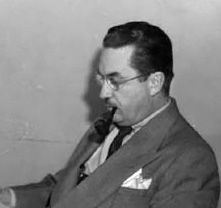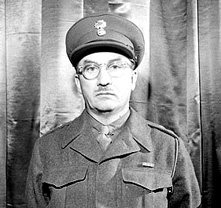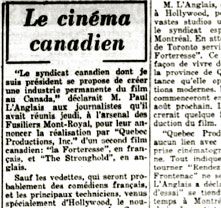Paul L'Anglais (1907-1982)
-

Source : Cinémathèque québécoise, 1998.2112.PH.3934
-

Source : Cinémathèque québécoise, 1998.2164.PH.6332
-

Le Petit Journal, 23 June 1946, p.38
Source : Bibliothèque et Archives nationale du Québec
Lawyer and military man
The son of a judge, Paul L’Anglais became a lawyer in 1930. While studying at McGill University, he participated in military training programs, and he maintained an affiliation with the army until the end of the Second World War, at the conclusion of which he held the rank lieutenant-colonel. In addition to enabling him to acquire an excellent knowledge of English, this experience provided him with political contacts which served him throughout his life. He was very active and worked with the Chamber of Commerce and businessmen’s clubs—everywhere Montreal’s financial elite could be found. Like J.A. DeSève, he was a born entrepreneur. Nevertheless, radio interested him more than law. In 1932, he became a director of radio shows, a publicity agent and a producer. He founded his own company, Radio Programme Producers, which was quite active until the mid-1940s.
The most important French-Canadian producer of his day
While maintaining his interests in radio, L’Anglais became interested in cinema. Noting the success of Le père Chopin, he joined forces with a rich Quebec City businessman, René Germain, and founded his own company, Québec Productions Corporation. The firm attempted a daring move: the simultaneous production of a French-language and an English-language film based on the same story. Nevertheless, the resulting films, Whispering City (starring the American actors Paul Lucas and Mary Anderson) and La forteresse (with Nicole Germain and Paul Dupuis), had little success.
L’Anglais quickly understood that he had to tailor his work to the local market. He set in motion films that would establish the reputation of Québec Productions, such as Un homme et son péché, Séraphin, Le curé du village, Le rossignol et les cloches and Son copain. He was the one who urged Gratien Gélinas to adapt Tit-Coq to film, a project which in the end was produced by DeSève.
And then there was television
In the 1950s, L’Anglais was mostly involved in selling advertising for radio and television. He worked on the election campaigns of the provincial Parti Conservateur. In 1960 DeSève, wishing to benefit from L’Anglais’s contacts in the political world, joined his application for a new television network. Everything unfolded as planned and L’Anglais became vice president of the famous “Channel 10” (Télé-Métropole, today TVA), a position he held until his death.